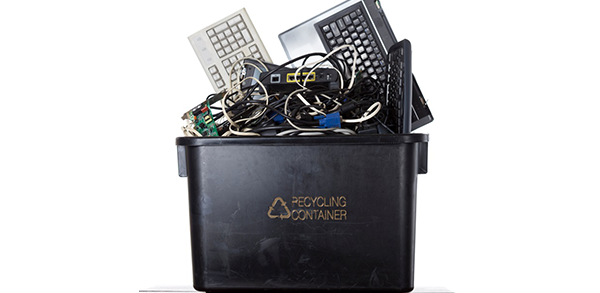
By Veena Clay March 3, 2015
E-waste diversion from landfills is quickly becoming a growing trend among states, and rightly so. As electronics production increases in response to growing demand for each new iteration of technology, e-waste has begun to pile up. Numbers and statistics for both production and obsolescence have skyrocketed, not just here in the U.S. but across the globe.
When e-waste is discarded in the same manner as common household trash, it most commonly ends up in landfills, causing manifold problems for the environment and local communities.
Many of the components of electronic devices are precious heavy metals, which can be toxic if left to seep into soil and groundwater. Additionally, vapors and fumes from languishing chemical components as well as from the incineration of electronics can cause severe disease and illness.
Landfill bans in some states have curbed the flow of e-waste to some extent, but it hasn’t prevented all e-waste from entering landfills. This has made e-waste diversion an important and top priority for a number of state legislatures, such as Illinois.
E-waste in Illinois: Current and Future News
Currently, Illinois is one of 11 states to impose a ban on landfill disposal of electronic devices. The state has long recognized the damaging effects that electronic waste can have on soil and groundwater resources, but it has also noted the potential gains that can be had from harvesting precious metals such as gold, platinum and silver from end-of-life devices, among other materials that can be reused in a sustainable manner.
Illinois’ main e-waste law, the Electronic Products Recycling and Reuse Act, took effect in 2008. It requires manufacturers, rather than local governments, to cover costs for the collection and transportation of certain electronics for recycling. Under the law, manufacturers receive incentives to refurbish obsolete electronics, in addition to donating still working yet discarded devices and slightly refurbished devices to schools and communities for reuse.
In 2011, the Illinois legislature introduced a number of amendments to the Act, including expanding the number of electronics covered from four electronic devices to 11, including scanners, portable music devices, keyboards, televisions, printers and more.
The new amendments also aimed to support the e-cycling industry by requiring manufacturers to maintain educational programs focused on proper e-waste disposal. Manufacturers also became responsible for ensuring at least 40 percent of the electronics they produced were recycled, and if not, were required to pay penalties of up to $10000 per day for violations of the law.
The Act also established free residential e-cycling programs that make it more convenient for consumers to discard their electronic devices properly, in addition to creating jobs and expanding the number of collection points across Illinois. Each point of collection is connected to a certified recycler that recycles the electronics and mines the devices for potentially reusable materials and metals.
However, electronics recycling in Illinois has run into issues of late concerning who will foot the bill for these programs. A new bill, House Bill 4204, introduced in November 2014, aims to address the growing problems surrounding these financial issues.
Who Will Pay for E-cycling In Illinois?
The Electronic Products Recycling and Reuse Act set goals for manufacturer-led recycling and its amendment extended those goals in a major way, but since those legislative activities, manufacturer goals have been falling short. This has forced recyclers to either foot the bill for electronics recycling or turn to local governments for funding.
As local governments began to terminate contracts with recyclers citing high costs, and as recyclers began terminating contracts themselves for the same reasons, electronic recycling hit turbulent times in Illinois. Many programs have threatened to shut down due to lack of funding, leading a number of legislators to fear a shortage of financial support would lead to widespread illegal dumping.
Although recycling electronics can be less expensive in comparison to the costs involved in manufacturing, the costs of e-waste collection and transportation can be a hindrance depending on the program methods used.
This isn’t helped by low manufacturer recycling goals, either. Once these goals are met, manufacturers tend to stop paying recyclers. Because annual goals are already low, recyclers must make up for the costs of electronics recycling themselves, a scenario which has pushed some recyclers into bankruptcy and left many residents without electronics recycling services.
This domino effect has resulted in a number of Illinois counties reporting increased amounts of illegal dumping – a situation that places the state squarely back in the same predicament the original e-cycling act aimed to prevent.
Getting E-cycling Back on Track in Illinois
Although the new bill was met with resistance from manufacturers, its intentions are good. It aims to meet the issue head on by increasing manufacturing goals.
The bill would also take the weight off local governments. The practice of charging local governments for e-cycling, as recyclers could no longer rely on pay from manufacturers, has recently acted as a short-term solution for keeping e-cycling alive in the state. The new bill would bar this practice.
Legislators hope passage of the new bill will create the necessary changes to keep electronics recycling programs throughout Illinois in operation. The possibility of increases in illegal dumping is also an issue motivating lawmakers to get the new law on the books as quickly as possible.
States Making Strides in E-cycling
Illinois is just one of a number of states keeping close watch on the progress of electronics recycling programs. If these programs failed, it could mean environmental damage on a large scale due to the hazardous nature of electronics components. It should come as no surprise then that lawmakers are taking all the steps necessary to support electronics recycling programs and to bolster state law to address any issues that could lead to their demise.